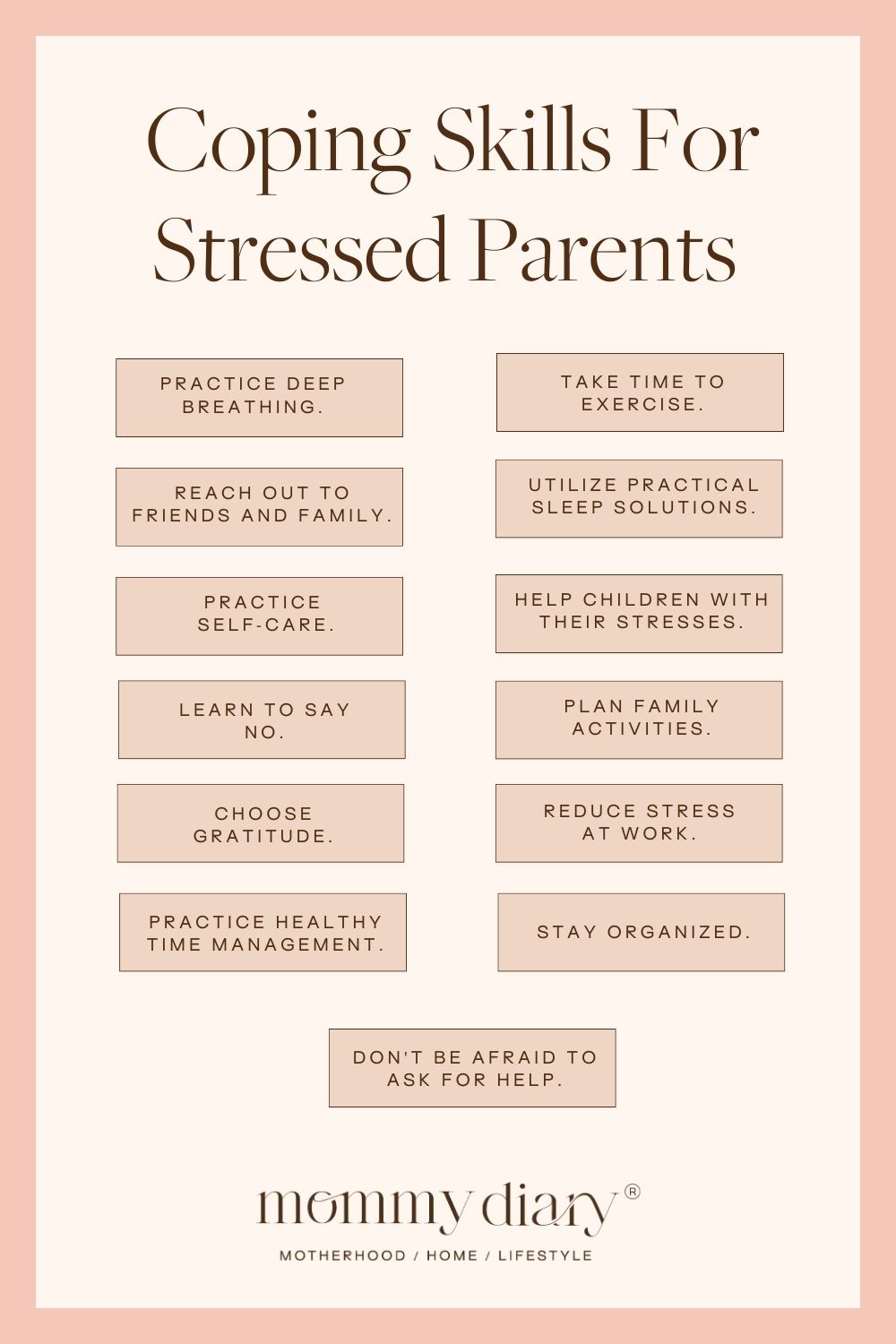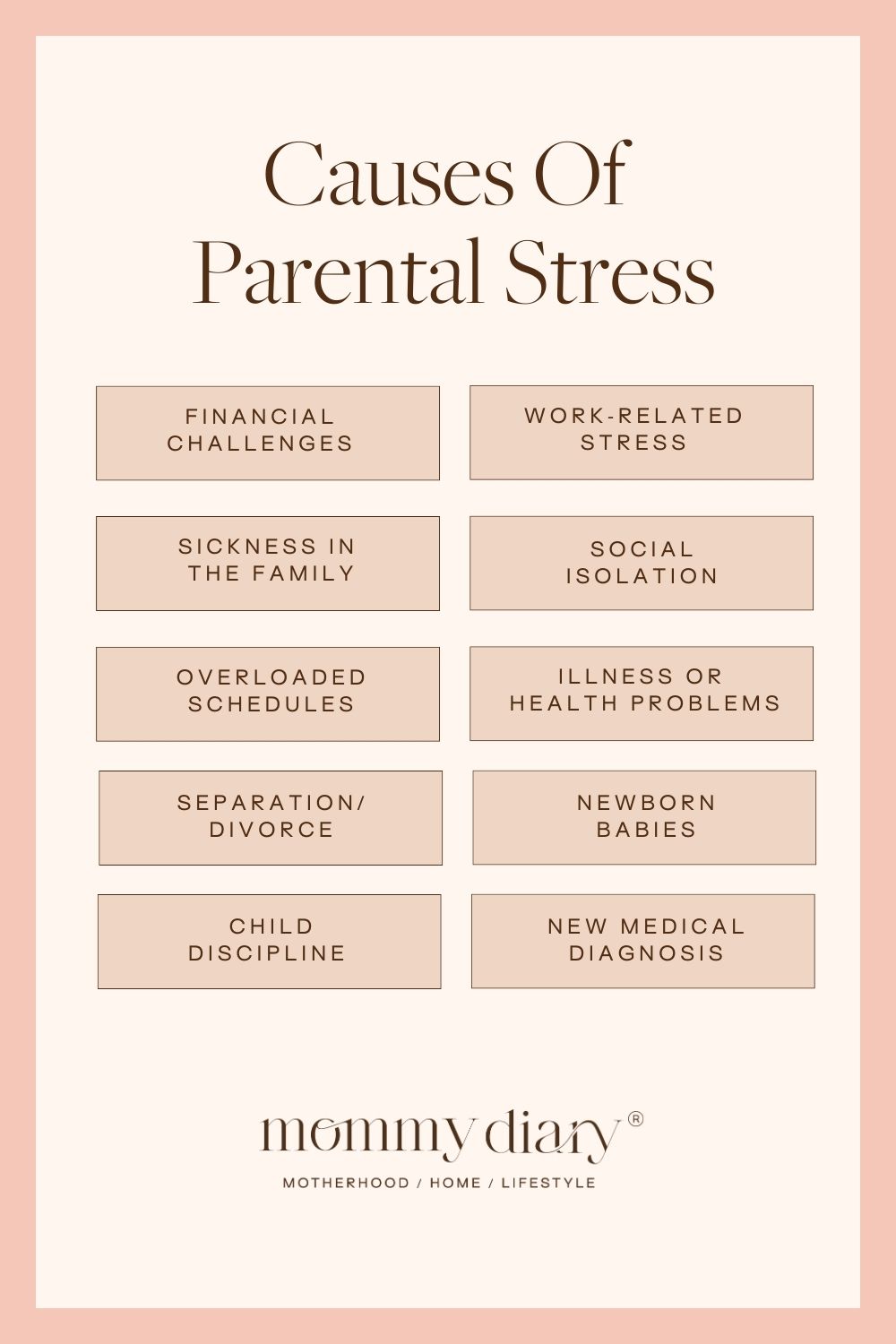I recently read a study from the American Psychological Association that stated that 3 out of 10 parents report their mental health worsened as compared to before the pandemic – mostly due to high-stress levels. Unfortunately, stress can strain the entire household, affecting relationships with both partners and kids.
As a parent, I understand how overwhelming it can be to simultaneously manage a household, take care of the kids, maintain a career, and handle all your other responsibilities. Sometimes, it can feel like the pressure is too much, and stress levels can rise. If this is how you’re feeling, know you’re not alone.
Still, as parents, we need to learn coping skills to stop the cycle of stress before it strains or even worse, ruins family relationships. For this reason, I want to discuss several coping skills for stressed parents, as well as how stress affects family relationships, the causes of parental stress, and how to reduce stress levels.
It truly does take a village to raise our precious little ones. So, here are some coping skills that have made a difference in my household, that I hope will make a difference in yours!

How Does Stress Affect Family Relationships?
When we are stressed, it can have a ripple effect on our entire family. Stress causes tension and arguments and leads to feelings of frustration and fatigue. When overwhelmed, providing the support and attention our children need can be challenging. This often leads to feelings of neglect or even rejection.
In addition, our children can pick up on our stress levels and begin feeling anxious and worried. This can cause them to act out, become withdrawn, or struggle with their emotional well-being.
Stress also impacts our relationships with our partners. When one parent is stressed, it can quickly strain the entire marriage. This can lead to more arguments and feelings of resentment, making it challenging to communicate effectively and solve problems together.

13 Coping Skills For Stressed Parents
Practice deep breathing.
Deep breathing is a technique that has been used for centuries to promote relaxation and reduce stress. When we take deep breaths, we signal our brain to slow down and relax. This can help lower our heart rate and blood pressure and reduce feelings of anxiety and tension.
To practice deep breathing, find a quiet and comfortable place to sit or lie down. Close your eyes and focus on your breathing. Take a slow, deep breath through your nose, filling your lungs with air. Hold your breath for a few seconds, then slowly exhale through your mouth, letting all the air out. Repeat this process several times, focusing on the sensation of the breath moving in and out of your body.
Taking deep breaths is a great tool in your stress reduction toolbox. So, next time you’re feeling overwhelmed or stressed, take a few minutes to practice deep breathing and notice its positive effects on your mind and body.
Reach out to friends and family.
Connecting with friends and family can be a precious resource and coping strategy to help you better manage parenting challenges. Forming connections with other families whose children are similar in age to yours can also bring comfort, as it often proves that you’re not alone amidst all the stress.
Even more, talking with other moms can put your stressors into perspective and normalize all the ups and downs of parenthood.
Practice self-care.
Taking time for yourself will help feelings of anxiety or overwhelm. Whether it’s an hour in the evening (after the kids go to bed), during lunchtime, or early in the morning, make sure to carve out some “me time.”
Read, take a warm bath, or do any other activity that helps you relax and relieve stress. Some of us might prefer watching television to decompress, while others might opt for playing a sport or engaging in a more hands-on project. It’s all about finding what works best for you and setting aside time. For tips on practicing self-care at home, read this post.
Learn to say no.
Saying no can be difficult, but it’s essential to prioritize and take on only what you can handle.
A critical aspect of learning to say no is being assertive. Assertiveness means communicating your needs and boundaries clearly and directly without being aggressive or disrespectful. This can take practice, but it is an essential skill for reducing stress and maintaining healthy relationships.
When saying no, be honest and upfront about the reasons. We don’t need to provide a detailed explanation at the moment. A simple “I’m sorry, I can’t commit to that right now” or “I don’t have the bandwidth for that at the moment” can suffice. Avoid making excuses or feeling guilty for setting boundaries.
Choose gratitude.
It’s important to remain grateful for the little things, like the fact that we can provide for those we love. In moments of heightened parental anxiety, take a step back and recognize how privileged we are to have someone we can prepare meals for, wipes boogers, or give a hug.
We may often feel as though life pulls us in different directions. However, that does not mean it isn’t worth the effort if our goal is to give ourselves and our families a better life. If necessary, modifications to our mindset or perspective might be useful to help us see our circumstances more positively. While there is undoubtedly difficulty inherent in providing for loved ones, it is essential to remember why it is so important—that they are among our greatest blessings.
Practice healthy time management.
Maintaining a healthy, balanced lifestyle is easier said than done, but it doesn’t have to be overwhelming. For starters, avoid overscheduling. For example, signing kids up for too many extracurriculars can increase stress levels for both kids and parents alike with the extra time requirements and coordination. Therefore, it’s important to recognize when enough is enough and leave time in your schedule for relaxation and self-care.
Take time to exercise.
Maintaining a balanced lifestyle should include physical activity. Exercise helps maintain strong and healthy bodies, and its known benefits of reducing stress levels make it an essential element of maintaining wellness. Working out doesn’t have to require expensive memberships or pricey equipment either; finding simple activities like stretching or even spending time walking or going on a family hike is all you need!
Utilize practical sleep solutions.
Several practical sleep solutions can help improve sleep quality and reduce stress levels for parents. Establishing a sleep routine involves going to bed and waking up at the same time every day, even on weekends! This can help regulate the body’s internal clock and promote better sleep quality.
In addition to establishing a sleep routine, several changes can be made to the bedroom environment to improve sleep quality. For example, using blackout curtains can help block out light and promote a darker sleeping environment. Or, trying to avoid stimulating activities before bedtime, such as using electronic devices. These activities can interfere with the body’s natural sleep-wake cycle and make it harder to fall asleep.
Help children with their stresses.
Our children need us to be positive models so they can learn how to regulate their emotions and cope with stressful situations. Start when they are babies by talking to them in a calm, understanding manner; this helps them develop strong social skills, empathy, and an ability to control their own emotions. Parents can significantly impact how children handle stress as they grow up, especially if their temperament is high-strung or so-called “difficult”.
Regarding siblings, learning how to get along is especially important – making it important to be proactive. Learning how to navigate sibling rivalry or consciously not allowing that type of negative behavior can help prevent stress in the household. When we moms teach our children conflict resolution skills―such as negotiating, seeing things from the other sibling’s perspective, and coping skills―there is more calm and peace within the home. Teaching these skills can help siblings resolve disputes faster and build confidence and self-awareness for each child. If you’re interested in learning more about how to get siblings to play together, read my recent post here.
Plan family activities.
Spending time with family is a great way to recharge and reduce stress. Getting caught up in daily routines and obligations can be easy. But, setting aside time for your family activities can help everyone feel more connected and less overwhelmed.
Simple activities like going for a walk or bike ride, playing board games, or cooking together can be a fun and meaningful way to spend time together. Even sitting down to eat a meal together without distractions can foster stronger family relationships and reduce stress.
Reduce stress at work.
When work stresses pile up, it can make it harder to manage everything else – including parenting responsibilities. That’s why reducing stress at work is an essential part of managing parental stress.
One way to reduce stress at work is to take breaks throughout the day. It’s easy to get caught up in work and forget to take a moment to breathe and relax. But, taking just a few minutes to step away from work can help you reduce stress levels and improve productivity in the long run.
Keep in mind, also, that parents who work full-time may feel stressed by the sheer number of responsibilities they have to handle. By delegating certain tasks to other colleagues or family members, it can lighten the load and reduce the feeling of being overwhelmed. See my roundup of age-appropriate chores for kids here.
Try to establish healthy boundaries between work and home life. This means setting limits on work emails and phone calls outside of work hours and taking time for self-care and family time.
Stay organized.
Organization is a great way to reduce stress and help manage stressors. Keeping your home tidy, creating to-do lists, and setting rules around clutter can all contribute to keeping you organized and stress-free.
Taking the time to go through your home and declutter will help keep your space more orderly. Scheduling in time for yourself and for tasks that need completing will ensure that everything is done on time, reducing stress levels further. Consider adding new habits like the Sunday Reset Routine I discussed in this post. This will give you an idea of how I like to schedule and plan the week. It will help to reduce stress and identify any potential issues before they become major sources of stress.
Don’t be afraid to ask for help.
It can be comforting to know that asking for help isn’t a sign of failure but rather an act of acceptance that we are not perfect, nor do we have to be. It is ok to reach out and ask your family or spouse for help when times get tough. Even small instances like having someone pick up the kids from practice or taking over making dinner while you take a break can make all the difference in relieving stress and helping you feel more capable and connected with your family.

Causes Of Parental Stress
When stress becomes overwhelming and prolonged, the risks for mental health problems increase.
Long-term effects of parental stress increase the risk of mental health problems such as anxiety and depression, substance use problems, sleep problems, and pain. And even bodily complaints such as muscle tension.
There are many causes of parental stress, including:
- Financial challenges
- Sickness in the family
- Overloaded schedules
- Separation/divorce
- Child discipline
- Work-related stress
- Social isolation
- Illness or health problems
- Newborn babies
- New medical diagnosis
Let’s work together to create a stress-free environment for ourselves and our children.
We have discovered that we can cope with stress and feel more in control of our lives in many ways. Taking care of ourselves, reducing stress, staying organized, and asking for help when needed. This can help us to foster a joyful family environment that promotes calmness and understanding among all members. Connecting with loved ones also provides an outlet to express feelings. It also reminds us that we are not alone in our efforts as moms. Ultimately, by giving ourselves the same kindness we show our children, we are better equipped to handle the stressful aspects of everyday life!
For more tips on motherhood and balancing day-to-day life as a busy mom, visit my blog HERE.

